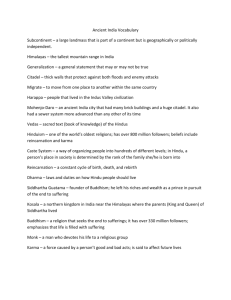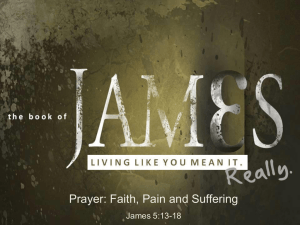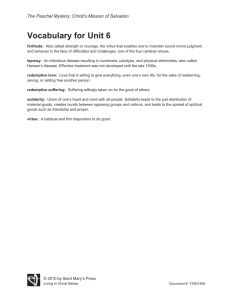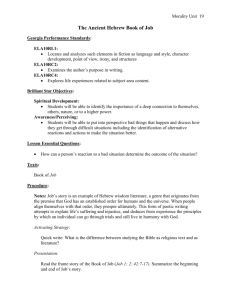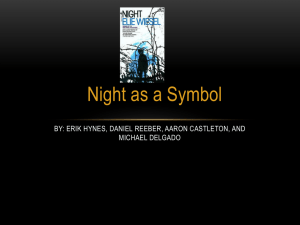“God is Good—Inscrutable, but Good” Based on Job 1:1, 2:1
advertisement
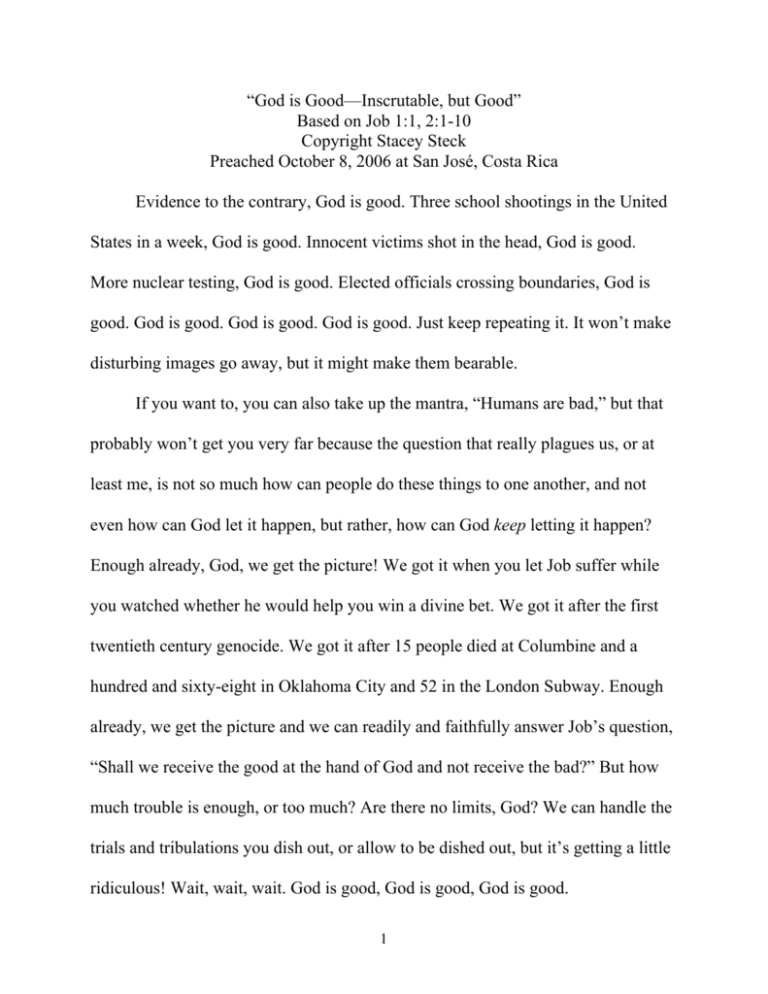
“God is Good—Inscrutable, but Good” Based on Job 1:1, 2:1-10 Copyright Stacey Steck Preached October 8, 2006 at San José, Costa Rica Evidence to the contrary, God is good. Three school shootings in the United States in a week, God is good. Innocent victims shot in the head, God is good. More nuclear testing, God is good. Elected officials crossing boundaries, God is good. God is good. God is good. God is good. Just keep repeating it. It won’t make disturbing images go away, but it might make them bearable. If you want to, you can also take up the mantra, “Humans are bad,” but that probably won’t get you very far because the question that really plagues us, or at least me, is not so much how can people do these things to one another, and not even how can God let it happen, but rather, how can God keep letting it happen? Enough already, God, we get the picture! We got it when you let Job suffer while you watched whether he would help you win a divine bet. We got it after the first twentieth century genocide. We got it after 15 people died at Columbine and a hundred and sixty-eight in Oklahoma City and 52 in the London Subway. Enough already, we get the picture and we can readily and faithfully answer Job’s question, “Shall we receive the good at the hand of God and not receive the bad?” But how much trouble is enough, or too much? Are there no limits, God? We can handle the trials and tribulations you dish out, or allow to be dished out, but it’s getting a little ridiculous! Wait, wait, wait. God is good, God is good, God is good. 1 That God is “good” is a central affirmation in the Judeo-Christian tradition. “Why do you call me good? Only God is good,” responds Jesus to the man who addresses him as “Good Rabbi.” Our reading of Scripture tells us that God is almighty, all powerful, all knowing, all compassionate, but most of all, that God is all good. God blesses, God wants for us Shalom, that ancient word for comprehensive human well-being, God forgives and heals—these are signs of a good God, not a capricious God, or a retributive God, or a God who is indifferent to the suffering of those of God’s own making. Above all, God’s goodness is revealed in Jesus Christ, the very son of God who brought blessing, Shalom, forgiveness, and healing with him as he came into our world. Yes, God is good, God is good, God is good! Our intuitions and affirmations about God’s goodness do not, unfortunately, offer us much protection from suffering, as Job found out. Earlier in the story, he has already had taken from him his wealth and family, save his wife, to whom we shall return shortly. These losses, we are told, stem from God’s belief in Job’s righteousness, a righteousness God believes can endure even in the face of a complete reversal of fortune. The Satan believes otherwise, suggesting that the only reason Job can affirm God’s goodness is because of the very blessings he will shortly lose. From this perspective, Job’s faith is transactional; he gives something because he gets something. A divine bet is made and Job is the loser, first of his wealth and family, and now, in our passage tonight, of his health. 2 Before we are too quick to attribute Job’s suffering to God, let us remember that this story is recorded for us in Scripture not as a factual retelling of one man’s misery, but as a way to delve into a discussion of the all too common occurrance of unmerited suffering. The recounting of God’s conversation with the Satan serves narrative, not historical, purposes, knowing as we do that no one has ever seen God, not even the author of the book of Job, and because the punchline of the book is that no mortal can know the mind of God, not even Job. The book of Job, then, is a divine gift that helps us to make sense of what we experience both about God and about human life, namely that even though God is good, and we may be righteous, we are not exempt from suffering. It actually makes little difference if we believe that God is the cause of suffering or simply chooses to let it happen; the result is the same either way. It also makes little difference if we believe God causes or allows suffering to teach us something or build our faith or if it just occurs randomly and expectedly as a feature of the human condition. The result is the same either way. And so we are back to where we began, wondering how to make sense out of all the awful news we absorbed this week, as well as the trials of our own homes, families, and workplaces. God is good, God is good, God is good. This past Thursday, the Men’s Bible study read the passage in Second Corinthains in which Paul shares, in no few lines, the length, breadth, and depth of his suffering for the sake of the Gospel: beatings, near starvation, shipwrecks, and the like. Reflecting on this, it occured to us that Paul’s sufferings were not endured 3 because was called to suffer, but rather because in the course of faithfully following his call, he would inevitably find himself in conflict with those with the power to make him suffer. This is, I would submit, an acceptable, or at least more endurable form of suffering, for at least we had our own hand in it. We may have been naive about the opposition we might face in living a Gospel-led life, but at least we can see the cause and effect of it, evil opposing good that opposes evil. To say that Paul’s suffering, and the suffering we may endure for the sake of our proclamation of the Gospel, is merited, is not to say he, or we, deserve it, but rather to say that it is understandable, and maybe even predictable, if tragic. But what has happened in the telling of Job’s tale, and what has happened in the three U.S. schools this past week is of another category, that of unmerited suffering, the suffering of innocent bystanders who were in the wrong place at the wrong time. It is the unmerited variety of suffering the somehow stings a little more painfully in our souls than its merited twin, for with the latter, we can at least see something resembling a reason. The majority of the book of Job is a debate between those who believe that Job must have done something to deserve his fate, that there was a reason, an action of his own doing, that caused him to lose everything, and Job himself who, as strange as it might seem, ends up defending unmerited suffering, as he proclaims his innocence. Job’s friends have the best of intentions; they want to uphold the honor of God at any price, to make sure that God does not get pinned 4 with doing wrong by punishing an innocent man. Dude, you must have done something, cause that’s the way it works around here – the righteous prosper and the wicked suffer. God don’t make mistakes so if you only search deep enough, they tell him, you’ll find that sin and then you’ll have your answer for why you are lying in ashes scraping your sores. Even before these more than twenty chapters of debate poetry begin, Job’s wife has chimed in with her solution, really just an introduction to this way of thinking: “Do you still persist in your integrity? Curse God, and die.” She seems to be saying that there surely must be more sin coming from the same source that has caused this suffering. She has bought the convenient, if unrealistic, logic of her time: that there is no such thing as unmerited suffering. The catch is that we already know Job’s suffering is unmerited, that he is the victim of games in the divine court. And so we watch the drama unfold, and we watch Job’s responses that take lead him to the threshold of taking his wife’s advice, as his suffering lingers on. But even as he laments, and questions God, and is angry with God, he does not give up proclaiming his innocence, and does not do what will cause God to lose God’s bet: to confess to a sin he did not commit, and thereby curse God by denying God’s goodness. “Shall we receive the good at the hand of God and not receive the bad?” God is good, God is good, God is good. The gist of the book of Job is this: that God is good – inscrutable, but good. God’s final discourse at the end of the book reaffirms that God is God and Job is not. Job receives no explanation for what he has endured, mainly because God 5 doesn’t need to give one. The inscrutable God is proven right; Job maintains his integrity to the end. But what is it about Job that makes him able to go the distance, to come out on the other end of unmerited suffering without giving up hope, without falling into the dispair which is characterized by his wife’s advice, “Curse God and die?” From where does the proverbial “patience of Job” come? I believe it comes from what we today call faith, a faith defined, more or less helpfully by the Reformer John Calvin, like this: faith is a “Firm and certain knowledge of the divine goodwill toward us, based on the truth of the free promise in Christ, and both revealed to our minds and sealed on our hearts through the Holy Spirit.” Let me say offer Calvin’s words again, that faith is a “Firm and certain knowledge of the divine goodwill toward us, based on the truth of the free promise in Christ, and both revealed to our minds and sealed on our hearts through the Holy Spirit.” Note the key words here: “divine goodwill.” Faith is not having all the answers about God. Faith is trusting that God has our best interests in mind, despite what may be going on around us. Faith is not being able to assent to creeds and confessions, as important as those things may be, but holding firm to a belief that God is good, God is good, God is good. Faith is not considering God unquestionable. Faith is knowing that there even in the absence of the answers we might like, God is still good – inscrutable but good. Inscrutable. It’s a funny sounding word, but it has an important meaning. In this case, to say God is inscrutable means that God’s ways are not our ways, and 6 God’s thoughts are not our thoughts. It means that as much as we may have a firm and certain knowledge of the divine goodwill toward us, the full nature of that goodwill, and the way it is expressed is still largely mystery to us. That may not seem very satisfying, but consider the alternative: that we always know exactly what God has in store, that our lives are pre-programmed, choiceless, exercises in marking time. And inasmuch as we might find it troubling sometimes to live in a world frequented by tragedies the likes of which we learned this week, how much more tragic would our lives be if we were responsible for all God is responsible for. You may have seen that rather silly movie with Jim Carrey called “Bruce Almighty,” in which the main character’s challenges to God about his so-called unmerited suffering earn him a turn as God, and all that involves, including being privy to every prayer of millions of people, of having every action cause an enormous reaction with tragic consequences. The novelty wears off quickly, and Bruce is soon begging to be back to his old, surly self. You see, if God is no longer inscrutable, we might as well be God, and if you think your life is already filled with just about all the pathos and responsibility and challenges you can handle, give thanks that God takes on not only your share when it gets to be too much, but every one else’s as well. If the trade off for being able to answer the question of why God keeps allowing such suffering is the loss of what makes God God, like Job, I’ll be happy to keep asking the more important, if rhetorical, question, “Shall we receive the good at the hand of God and not receive the bad?” and repeating my 7 mantra, God is good, God is good, God is good. The truth is that there is no adequate answer for the fact of unmerited suffering, even from a source like the book of Job that dares to tackle it. But the good news is that that truth doesn’t change the fact that through the eyes of faith, we can still have a firm and certain knowledge of the divine goodwill toward us, based on the truth of the free promise in Christ, and both revealed to our minds and sealed on our hearts through the Holy Spirit. That, my friends, is what makes suffering endurable, for Job, for the families of those killed in the school shootings, and for victims and survivors everywhere, for a good and mysterious God will always make our burdens easier to bear than a tame and understandable God. Amen. 8
